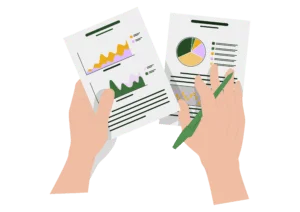
ESG Alphabet Soup: A quick guide to sustainability disclosure standards and frameworks
Sustainability issues are complicated, and sustainability reporting for your business can be just as confusing. The world of ESG is full of acronyms and buzzwords that can feel like an alphabet soup.
Luckily, we know our stuff here at SustainIt. This post compiles a handy list to help you decipher the most widely used ESG disclosure standards and sustainability frameworks – from SSBI to ESRS.
Widely used acronyms for sustainability reporting
You’re probably familiar with these! But here’s a quick outline of three key terms used throughout the sustainability industry.
ESG – Environmental, Social and Governance
- Data used to determine your business’s impact on the environment and society. Widely used by investors and stakeholders to understand the sustainability of an organisation.
EHS – Environmental, Health and Safety
- Measures taken by businesses to ensure their operations do not cause harm by protecting the environment and maintaining health and safety. EHS software manages data relevant to these areas.
CSR – Corporate Social Responsibility
- Ways that your business can ‘do good’ and contribute to society (e.g. volunteering, diversity etc.)

Frameworks
Sustainability frameworks provide principles and guidelines for how to approach sustainability within your business. Think of them as broad, big-picture guidance. We’ve listed some widely used regulatory and voluntary frameworks below.
CSRD – Corporate Sustainability Reporting Directive
- New EU legislature (building on NFRD, see below) that requires businesses to report social and environmental impact activities. Defines a reporting framework and encourages responsible business conduct.
Five Capitals Framework
- A framework of sustainability for businesses based on the idea of ‘capital’ used to deliver services and products – natural, human, social, manufactured and financial capital. A sustainable business maintains and enhances these capitals rather than depletes them.
ISSB – International Sustainability Standards Board
- Developed at COP26, ISSB is a board that develops IFRS Sustainability Disclosure Standards (SDS) – reporting standards for sustainability-related financial information building upon the SASB standards.
NFRD – Non-financial reporting directive
- An EU regulatory framework that requires large businesses to report on their ESG data by law.
SASB – Sustainability Accounting Standards Board
- A framework that provides disclosure standards for companies about the financial impacts of ESG.
SDG – Sustainable Development Goals
- The renowned 17 global goals by the UN – provide a “shared blueprint for peace and prosperity for people and the planet now and into the future”. These provide global guidance for us as businesses to aim for.
SECR – Streamlined Energy and Carbon Reporting
- UK framework and legislation about carbon reporting for large businesses.
UNGC – United Nations Global Compact
- An integrated reporting framework with 10 principles to guide CSR in line with the UN SDGs. The largest corporate sustainability initiative used by businesses around the world.
UNGPR – UN Guiding Principles Reporting Network
- Global guidance for companies to report on respect for human rights.

Disclosures, reporting standards and boards
Disclosures provide detailed standards on how to report your ESG data. Many different boards set these specific guidelines for sustainability reporting. Here’s a list of some of the ones your business might come across or use.
CDP – Carbon Disclosure Project (formerly)
- UK non-profit running a global disclosure system to encourage businesses to disclose their environmental information. They now work with 6000+ corporations to manage their environmental impacts.
CDSB – Climate Disclosure Standards Board
- Global standards-setting body for sustainability reporting that has now been incorporated into the ISSB.
CRD – Corporate Reporting Dialogue
- A group of eight providers of corporate reporting (both financial and non-financial) working together to achieve coherence and comparability between reporting frameworks and standards.
DJSI – Dow Jones Sustainability Indexes
- The DJSIs are a set of benchmarks that assess companies on their sustainability. The top 10% of sustainability-driven businesses are ranked.
ESRS – European Sustainability Reporting Standards
- EU mandatory standards of reporting for companies under the CSRD. Outline measures to be used in reports for comparable ESG data.
FTSE4Good – Financial Times Stock Index for Good
- Stock index based on sustainability (CSR) credentials and ESG practices.
GHG Protocol – Greenhouse Gas Protocol
- A joint initiative by the WRI and WBCSD to provide globally recognised accounting and reporting standards for measuring emissions.
GRESB – (formerly Global Real Estate Sustainability Benchmark)
- International benchmark showing ESG performance in real estate.
GRI – Global Reporting Initiative
- An international non-profit that supports organisations with sustainability reporting and communication. Sets widely used standards and guidelines for businesses.
IFRS – International Financial Reporting Standards
- A non-profit developing accounting and sustainability disclosure standards that are global and transparent. Developed by two boards including the ISSB.
ISEAL Alliance – International Social and Environmental Accreditation and Labelling Alliance
- A global organisation for sustainability standards with codes and credibility practices.
SBTI – Science-Based Target Initiative
- Define and promote best practices in science-based target setting for corporations– a way of measuring environmental impact.
SFDR – Sustainable Finance Disclosure Regulation
- EU regulations to guide the ESG disclosures of financial institutions. Improves transparency and reduces greenwashing.
TCFD – Task Force on Climate-Related Financial Disclosures
- A UK working group aiming to develop a set of voluntary climate-related financial risk disclosures for companies to use to inform their investors and the public about the risks they face regarding climate change.
Hopefully, this glossary gave you a quick, helpful breakdown of all the different buzzwords and jargon in the world of corporate sustainability.
——————-
Still confused? If you’d like help reporting your ESG data or using a sustainability framework in your business, get in touch to chat with one of our consultants. We have all the expertise to assist with your sustainable business journey.

